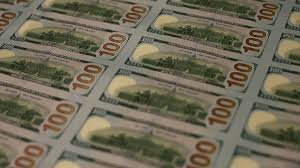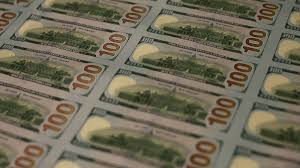
According to new research from Capital Economics, a number that has been rising steadily for years is holdings of about $2.6 trillion in overseas earnings by American companies even as they are looking to avoid paying domestic tax rates.
The U.S. rate would be lowered to incentivize companies to repatriate — bring home — that money, under President Donald Trump’s tax plan calls for a "holiday".
The U.S. corporate tax rate is the highest in the world at 35 percent. And overseas earnings are being kept abroad in tax shelter countries like Ireland and Luxembourg by many multinationals because of this tax rate.
However, according to Andrew Hunter, U.S. economist for Capital Economics, approval of the broader plan that entails the tax holiday is unlikely.
"With the deep cuts to individual income and corporate tax rates estimated to increase the federal budget deficit by $7 trillion over a decade," he wrote, "there is next to no chance of the plan ever being approved by Congress in its current form."
Senate rules are the main obstacles for the Trump tax plan. The Senate cannot increase the deficit beyond a 10-year horizon, which the tax plan is estimated to do even though reconciliation bills need only a majority in the Senate. Garnering 60 votes in the Senate and be signed into permanent law is the alternative.
"The chances of the latter happening are close to zero," Hunter wrote.
Resistance from fiscal hawks among the GOP is likely to run down Trump's tax plan. While economists disagreed, the White House said that the long-term deficit overrun would be made up by the economic gains resulting from the tax cuts.
Potential repatriation of that $2.6 trillion held overseas is one of the few parts of the tax plan that could generate additional revenues. That could spur economic growth and that's about 14 percent of the nation's gross domestic product.
A recent working paper suggested that the funds held overseas could have an effect on U.S. productivity growth.
A call for a "one-time tax on trillions of dollars held overseas" was among the 12 bullet points in the tax reform plan released Wednesday. While the last tax holiday allowed companies to repatriate overseas earnings at a tax rate of 5.25 percent, it was unclear what that reduced rate would be. In another attempt to stimulate the economy, that was enacted by President George W. Bush in 2004.
During the previous tax holiday, around two-thirds of overseas earnings were repatriated according to Hunter's note. According to RBS, that was about $362 billion.
The prior example suggests that up to $1.7 trillion could be repatriated by U.S. companies if Congress enacts a similar tax holiday. Though estimates suggest that around half of the $2.6 trillion is held in cash, estimating how much of the funds are in foreign bank accounts or short-term investments is the trouble. The note said that the rest is likely held in other, more illiquid assets like factories and equipment. Earnings on those resources would be much harder to repatriate.
(Source:www.cnbc.com)
The U.S. rate would be lowered to incentivize companies to repatriate — bring home — that money, under President Donald Trump’s tax plan calls for a "holiday".
The U.S. corporate tax rate is the highest in the world at 35 percent. And overseas earnings are being kept abroad in tax shelter countries like Ireland and Luxembourg by many multinationals because of this tax rate.
However, according to Andrew Hunter, U.S. economist for Capital Economics, approval of the broader plan that entails the tax holiday is unlikely.
"With the deep cuts to individual income and corporate tax rates estimated to increase the federal budget deficit by $7 trillion over a decade," he wrote, "there is next to no chance of the plan ever being approved by Congress in its current form."
Senate rules are the main obstacles for the Trump tax plan. The Senate cannot increase the deficit beyond a 10-year horizon, which the tax plan is estimated to do even though reconciliation bills need only a majority in the Senate. Garnering 60 votes in the Senate and be signed into permanent law is the alternative.
"The chances of the latter happening are close to zero," Hunter wrote.
Resistance from fiscal hawks among the GOP is likely to run down Trump's tax plan. While economists disagreed, the White House said that the long-term deficit overrun would be made up by the economic gains resulting from the tax cuts.
Potential repatriation of that $2.6 trillion held overseas is one of the few parts of the tax plan that could generate additional revenues. That could spur economic growth and that's about 14 percent of the nation's gross domestic product.
A recent working paper suggested that the funds held overseas could have an effect on U.S. productivity growth.
A call for a "one-time tax on trillions of dollars held overseas" was among the 12 bullet points in the tax reform plan released Wednesday. While the last tax holiday allowed companies to repatriate overseas earnings at a tax rate of 5.25 percent, it was unclear what that reduced rate would be. In another attempt to stimulate the economy, that was enacted by President George W. Bush in 2004.
During the previous tax holiday, around two-thirds of overseas earnings were repatriated according to Hunter's note. According to RBS, that was about $362 billion.
The prior example suggests that up to $1.7 trillion could be repatriated by U.S. companies if Congress enacts a similar tax holiday. Though estimates suggest that around half of the $2.6 trillion is held in cash, estimating how much of the funds are in foreign bank accounts or short-term investments is the trouble. The note said that the rest is likely held in other, more illiquid assets like factories and equipment. Earnings on those resources would be much harder to repatriate.
(Source:www.cnbc.com)














